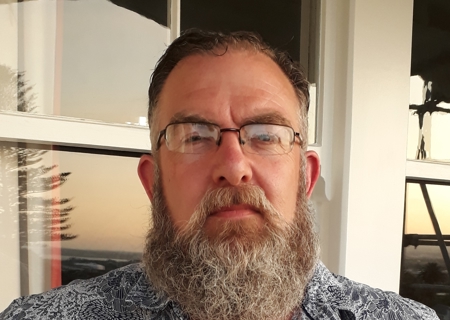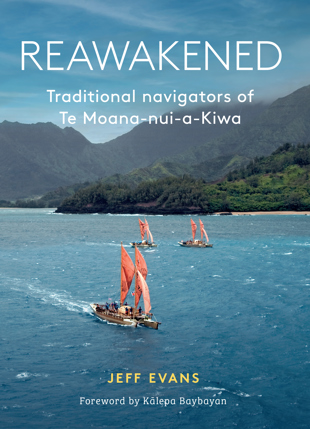Q1: What first drew you to the subject of traditional wayfinding and voyaging?
I had met several of the Pwo navigators while writing the biography of the late Sir Hec Busby and was drawn to them as much by their personalities as by their ability to navigate using the stars, the moon and sun, the ocean swell and any number of other signs gleaned from the environment. There is a humble confidence that radiates from them. They are all quite exceptional individuals and I thought that more people should be aware of them, what they do and what they stand for.
Q2: Have you had the opportunity to sail on one of these waka yourself?
I’ve only sailed once on a voyaging waka, and it was just an overnight trip from Auckland up to Tutukaka in 1999. But it was a wonderful experience. I was very much a passenger, but the crew were fantastic and made me feel at home. We had dolphins escort us for a while at dusk and the sunrise the next morning was magical. The trip certainly made me appreciate how small the deck of a voyaging canoe can be and how important it is to have a harmonious crew on board.
Q3: Why did you chose to interview this group of navigators?
The ten men profiled are the first navigators from Polynesia to be recognised as having reached the Micronesian rank of Pwo in living memory, and probably ever. The rank is the equivalent of a traditional master navigator. What is interesting is that the Pwo rank has arguably more responsibility on land than on the ocean. On the ocean they are responsible for guiding their waka to places where they can harvest fish, turtles and other food stuffs. They are also responsible for the welfare of their crew and their canoe. On land they are said to be a shining light for the entire community to follow. They are apart from traditional chiefs, but they have an important role.
Q4: Renowned Satawal navigator Mau Piailug is central to the reawakening of traditional navigational skills in Polynesia. What would have happened if he had not returned to Hawai’i to help the Polynesian Voyaging Society?
What a question! I’m certain there would still be voyaging in Polynesia if Mau didn’t return to Hawai’i, simply because of the personalities involved, but whether voyaging would have reached the level it is at now is doubtful. Over the years Piailug not only shared what he knew about navigation, but he shared how to lash canoes properly, how to sail traditional voyaging waka, how a crew should act on the sea … These might sound like the basics, but so much of it had been lost in Polynesia after the arrival of Europeans.
Q5: What was one of the most interesting things that came out of your research?
Probably the most impressive thing was how the Pwo transitioned from wanting to learn how to navigate using the traditional methods to becoming leaders within their communities and stalwarts for the ocean. They are all committed to tidying up and then protecting our oceans.
Q6: How would you summarise the concept of Pwo and its significance to the navigators in the book?
Pwo is the foundation for everything they do. It informs how they think, how they act. Tua Pittman summed it up when he said, ‘I have been raised to be Pwo by Mau and Nainoa and in their teachings they have shared that Pwo is seen as the light for his island community or canoe by providing leadership, guidance, a sense of safety and protection, sustenance and provisions to survive. So, what navigates me as a Pwo? Knowledge and learning; humility and respect; a deep understanding of one’s culture and traditions; decision-making based on safety and survival; ensuring a healthy and safe environment for future generations in our communities; and camaraderie with fellow Pwo.’
Q7: The late Sir Heke-nuku-mai Busby is one of the navigators interviewed for the book. What was his vision for the Kupe Waka Centre at Aurere?
Hec Busby’s vision was for Kupe Waka to be a centre of excellence for all things voyaging. Waka have been built there. Navigators have studied on the star compass there. A new building to educate the next generation of crew and navigators will be open in the next 12 months. It will also be a place for crews to prepare for voyages, away from the distractions of modern society. Hec has departed us, but his vision will live on through his Kupe Waka Centre.
Q8: There are now waka and voyaging societies throughout Aotearoa and the Pacific. What are some of the future projects happening around ocean-voyaging?
There are currently in excess of twenty active voyaging canoes in Polynesia, and every voyage that is made is important, and every interaction one of the Pwo navigators has with their community is important. Not only is voyaging a way for Polynesians to connect with their ancestors, it is also a way to forge a sustainable path forward for their descendants.
That aside, the Okeanos Foundation have six Vaka Motu spread throughout the Pacific. These are smaller than voyaging canoes, and they are helping to transport people, food, medicine and supplies between Pacific Islands. The canoes are also made available to move experts, medical staff and medicine to outer islands when natural disasters strike. The Okeanos Foundation have also built eight Vaka Moana that are designed for voyaging between island groups.
Q9: What are you working on now?
I’m working on the history of the war canoe Ngā Tokimatawhaorua that sits at the Treaty Grounds at Waitangi. We’re incredibly fortunate that there is film footage surviving from 1937–1940 when the waka was built. It has a rich and fascinating history.
Q10: What are you reading?
I’m a big fan of non-fiction and at the moment I’m alternating between Siddhartha Mukherjee’s The Emperor of all Maladies and John McPhee’s Annals of the Former World. Both are Pulitzer Prize-winning publications, and both cover subjects that I have no real interest in — the geology of the United States and a ‘biography’ of cancer — but I can’t put them down.


